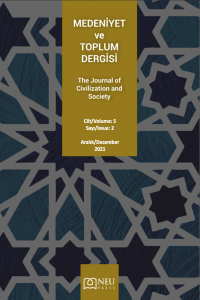Öz
Bu çalışmanın üç temel amacı vardır: Birincisi, arkadaşlık alanında ebeveyn otoritesinin meşruluğuna dair ebeveyn ve ergen inançları arasındaki farklılıkları incelemektir. İkincisi, arkadaşlıkla ilgili farklı konulardaki otorite inançları arasındaki farklılaşmaları incelemektir. Üçüncüsü, otorite inancının cinsiyet, ergenlik evresi, annenin eğitim durumu, kardeş sayısı ve doğum sırasına bağlı olarak farklılaşıp farklılaşmadığını incelemektir. Çalışmaya 449’u (% 56.1) kız, 292’si (% 36.6) erkek ve 58’i (% 7.3) cinsiyetini belirtmeyen toplam 800 ergen ve anneleri katılmıştır. Ergenlerin 384’ü (% 48) ortaokul, 416’sı (% 52) lise öğrencisidir (Ort. yaş = 14.2, S = 1.2). Araştırmada veri toplama aracı olarak demografik bilgi formu ve Arkadaşlıklar Üzerinde Ebeveyn Otoritesine Dair İnançlar Ölçeği (Mounts, 2008) kullanılmıştır. Elde edilen sonuçlar, annelerin otoritenin meşruluğuna dair inançlarının bütün alanlarda ergenlerinkinden daha yüksek olduğunu göstermektedir. Bununla birlikte hem anne hem de ergenlerin otoritenin meşruluğuna dair inancının en yüksek olduğu alan tedbir gerektiren konulardır. Son olarak, arkadaşlık alanındaki otoriteye dair inançlar cinsiyete, ergenlik evresine, annenin eğitim durumuna göre farklılıklar göstermektedir; ancak kardeş sayısı ve doğum sırasının etkisi anlamsızdır.
Anahtar Kelimeler
Sosyal Alan Kuramı Otoritenin Meşruluğu Arkadaşlık Alanı Özerklik
Kaynakça
- Bayar, Y. (2016). Ergen ve Anne Bildirimine Göre Ebeveyn Akran Yönetimini Öncülleri ve Akran İlişkileri Açısından Sonuçları, Yayımlanmamış Doktora Tezi, Ankara.
- Brendgen, M., Vitaro, F. & Bukowski, W. M. (2000). Stability and variability of adolescents’ affiliation with delinquent friends: Predictors and consequences. Social Development, 9, 205–225.
- Bukowski, W. M., Hoza, B., & Boivin, M. (1994). Measuring friendship quality during pre- and early adolescence: The Development and psychometric properties of the Friendship Qualities Scale. Journal of Social and Personal Relationships, 11, 471–484.
- Chen‐Gaddini, M. 2012. Chinese mothers and adolescents’ views of authority and autonomy: A study of parent–adolescent conflict in urban and rural China. Child Development, 83(6), 1846- 1852.
- Darling, N., Cumsille, P., & Pena-Alampay, L. (2005). Rules, legitimacy of parental authority, and obligation to obey in Chile, the Philippines, and the United States. New Directions for Child and Adolescent Development, 108, 47 – 60
- Darling, N., Cumsille, P., & Martínez, M. L. (2008). Individual differences in adolescents’ beliefs about the legitimacy of parental authority and their own obligation to obey: A longitudinal investigation. Child Development, 79 (4), 1103-1118.
- Kakihara F. & Tilton-Weaver, L (2009). Adolescents' Interpretations of Parental Control: Differentiated by Domain and Types of Control, Child Development 80 (6), 1722-1738.
- Kerns, K. A.,Klepac, L. V, & Cole, A. (1996). Peer relationships and preadolescents' perceptions of security in the child-mother relationship. Developmental Psychology, 32 (3), 457-466.
- Mounts, N. S. (2000). Parental management of adolescent peer relationship: What are its effects on friend selection? K. Kerns, J. Contreras ve A. Neal-Barnett (Ed.), içinde Family and peers: Linking two social world (169-193). Westport, CT: Praeger Publishers. Mounts, N. S. (2004). Adolescents’ perceptions of parental management of peer relationships in an ethnically diverse sample. Journal of Adolescent Research, 19, 446–467.
- Mounts, N. S. (2008). Linkages between parenting and peer relationships: A model for parental management of adolescents’ peer relationships. M. Kerr, H. Stattin ve R. Engels (Ed.), içinde What can parents do? New insights in to the role of parents in adolescent problem behavior (163–190). Malden, MA: Wiley.
- Nucci, L. P.,Camino, C., & Sapiro, C. M. (1996). Social class effects on North eastern Brazilian children’s conceptions of areas of personal choice and social regulation. Child Development, 67, 1223–1242.
- Nucci, L. P., Hasebe, Y. ve Lins-Dyer, M. T. (2005). Adolescent psychological well-being and parental control of the personal. New Directions for Child and Adolescent Development, 108, 17-30.
- Öztürk, A. ve Sayıl, M. (2012). Ergenin arkadaşları ve uyumu ile annenin akran yönetimi davranışları arasındaki ilişkilerde annenin inançlarının aracı rolü. Türk Psikoloji Dergisi, 27(69), 1-16.
- Sayıl, M. F. ve Kındap-Tepe Y. (2017). Ana Baba Ergen İlişkilerinde Kontrol, Özerklik ve Çatışmanın Sosyal Alan Kuramı ve Sosyal Değişim Bağlamında İncelenmesi: Ebeveyn ve Ergen Açısından Sonuçlar. 113K208 No’lu TUBİTAK-SOBAG Proje Raporu.
- Sayıl, M., Kındap, Y. Bayar, Y., Bayraktar, F., Kurt, D., Tığrak, A. ve Yaban, E. H. (2012). Ergenlik Döneminde Ebeveynlik ve Ergenin Psikososyal Uyumu. Ankara: Hacettepe Üniversitesi Yayınları.
- Smetana, J. G. (1988). Adolescents’ and parents’ conceptions of parental authority. Child Development, 59, 321-335.
- Smetana, J. G. (2000). Middle class African American adolescents’ and parents’ conceptions of parental authority and parenting practices: a longitudinal investigation. Child Development, 71, 1672-1686.
- Smetana, J. G., Ahmad, I., & Wray-Lake, L. (2015). Beliefs about parental authority legitimacy among refugee youth in Jordan: Between-and within-person variations.
- Smetana, J. G. & Asquith, P. (1994). Adolescents’ andparents’ conceptions of parental authority and personal autonomy. Child Development, 65, 1147–1162.
- Soenens, B. Vansteenkiste, M. & Niemiec, C. P. (2009).Should parental prohibition of adolescents’ peer relationships be prohibited? Personal Relationships, 16, 507-530.
- Steinberg, L. (2001). Adolesence (7. baskı). New York: McGrawHill.
- Tisak, M. S. & Tisak, J. (1990). Children’s conceptions of parental authority, friendship, and sibling relations. Merrill-Palmer Quarterly, 36, 347–367
- Turiel, E. (1983). The development of social knowledge: Morality and convention. Cambridge, England: Cambridge University Press.
- Turiel, E. (2002). The culture of morality: Social development, context, and conflict. Cambridge University Press.
- Way, N.,Greene, M. L. & Mukherjee, P. P. (2007). Exploring adolescent perceptions of parental beliefs and practices related to friendships in diverse ethnic communities. New Directions for Child and Adolescent Development, 116, 35-50.
- Yau, J. & Smetana, J. G. (2003). Conceptions of moral, social-conventional, and personal events among Chinese preschoolers in Hong Kong. Child Development, 74 (3), 647-658.
Ayrıntılar
| Birincil Dil | Türkçe |
|---|---|
| Bölüm | Araştırma Makaleleri |
| Yazarlar | |
| Yayımlanma Tarihi | 29 Aralık 2021 |
| Gönderilme Tarihi | 21 Haziran 2021 |
| Kabul Tarihi | 8 Eylül 2021 |
| Yayımlandığı Sayı | Yıl 2021 Cilt: 5 Sayı: 2 |
Bu eser Creative Commons Atıf-GayriTicari 4.0 Uluslararası Lisansı ile lisanslanmıştır.
This work is licensed under a Creative Commons Attribution-NonCommercial 4.0 International License.



